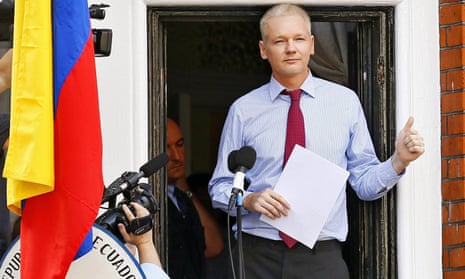WikiLeaks founder Julian Assange has denied filing a request for asylum in France after revealing the existence of a child he has not seen for five years.
His legal defence team took issue on Friday with a statement from the Elysee Palace that an asylum request from the Australian had been declined.
Defence team director Baltasar Garzon said in a statement an open letter written by Assange to the French president, Francois Hollande, had only expressed his willingness “to be hosted in France if and only if an initiative was taken by the competent authorities”.
Earlier Hollande’s office said in a statement it could not “act on the request”, adding Assange was not in immediate danger and there was a European arrest warrant out on him.
The Australian, who turned 44 on Friday, has been living in the Ecuadorian embassy in London since June 2012 to avoid extradition to Sweden, where he faces allegations by two women of rape, sexual molestation and illegal coercion.
He says he fears if he goes to Sweden he will be extradited to the US and charged over WikiLeaks’ release of classified documents.
In his open letter published in Le Monde newspaper on Friday, Assange described himself as a “journalist pursued and threatened with death by the United States’ authorities as a result of my professional activities”.
He wrote that “only France now has the ability to offer me the necessary protection against, and exclusively against, the political persecution that I am currently the object of”.
Such an offer of protection would be a “humanitarian and symbolic gesture” and send a message of encouragement “to journalists and whistleblowers around the world”.
Assange said in his letter he had not seen his youngest child or the child’s mother, who are both French, for five years.
“I have had to keep their existence secret up to today in order to protect them,” he wrote.
In response to the open letter, Hollande’s office said that “on account of the legal elements and material situation of Mr Assange, France cannot act on the request”.
But Garzon said contrary to assertions from the Elysee Palace, the Australian’s defence team “wishes to state very clearly that Julian Assange has filed no request for asylum in France”.
“No terminology in his letter to the president of the Republic can be interpreted in a different sense.”
Garzon said Assange’s letter was in part a response to recent comments by the French justice minister, Christiane Taubira, and he questioned how carefully Hollande’s office had interpreted the letter before providing a response “in such a rush”.
In his letter, Assange raised the issue of US spying on French leaders after WikiLeaks last week released documents indicating Hollande and the two previous presidents had been wiretapped.
The revelations caused widespread anger in France and prompted Taubira to say she would “not be shocked” if France decided to extend political asylum to Assange and fellow whistleblower Edward Snowden.

Comments (…)
Sign in or create your Guardian account to join the discussion